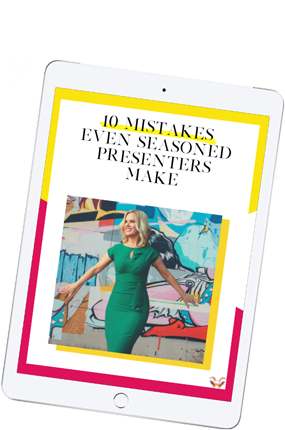Latest Posts
How to Embrace The Fear and Step onto The Stage

I’d like to share something with you about my fear of speaking.
It started when I was young. I was “painfully” shy. I hid behind my father or mother and refused to come out and engage with adults. I don’t know why I was paralyzed and grappling for my voice in new situations. I do know now that when I step in front of an audience of anywhere from 10 to 1000+ people, I still feel fear. The only difference between that little girl and the woman I am now is that I understand how to use that fear in a mobile direction, instead of freezing like a deer in the headlights.
I train people all the time in how to be comfortable on stage, how to drop the uneasiness in the pit of their stomach and be present in front of an audience. It’s not always as easy as 1,2,3… So what helped me?
I started dancing at age 5, which made me more comfortable to be on stage in a performance but I didn’t have to speak. So in Jr. High, I took the next step and started theater— which added the requirement of speaking. I studied acting in college and earned a degree. I then went on to get a directing degree.
I hear you groaning now, “Uh, Misty, I don’t have time for years of theater training. My presentation is in a week!!!”
I know you don’t have a time machine to go back and take dance or acting classes for 20 years to build your comfort zone on stage. But there are a few tools I can share that will help you ease into the spotlight and channel your fear in a positive direction:
1. Know that the fear exists in everyone.
I have been backstage with some incredible thought leaders and CEOs before they take the stage. I had one of them tell me he was going to vomit right before going on stage, he was so nervous. Next thing you know, he was on stage and left it with a standing ovation. Fear is normal. Fear is part of the journey, and it’s okay to have it.
[Tweet “Fear is part of the journey. publicspeaking @theaterofmktg”]
2. Think of it as a conversation.
Public speaking is a two-way conversation. You are speaking, but if the speech is crafted correctly, the audience will respond with verbal cues that provide instant feedback on the feelings you are creating for them. If you don’t hear the audience responding, it could be because they are intently listening. Silence is okay. Unless you’re asking a question and you hear crickets. But we can address that in a later post.
[Tweet “PublicSpeaking is a two-way conversation. @theaterofmktg”]
3. Rehearse your piece.
Rehearse it out loud, in your car, in the shower, in your office anytime you get a free moment. The more you know what you are going to say, the more comfortable you are with it. But your presentation has to be vocalized so you get used to hearing the tones in your voice and can adjust as you see fit. Don’t memorize your lines in a vacuum of silence. You need to practice your delivery.
If you are new to speaking, ask friends you trust to listen and give you loving feedback. Having a mini audience will help you find your moments in your piece and will create a living, breathing speech. You will discover humor you didn’t realize was there, uncover a moment that may need more clarification with a story to support it.
You may find that you are more prepared than you thought.
I have a few friends who are my go-to people to bounce my thoughts against, test my comedic pieces and get in return their heartfelt feedback, which is invaluable.
Note: You can over-rehearse a piece so much so that you plow through it without giving the audience time to react and be the second part of the conversation. Stop. Slow down. Know your piece enough to allow flexibility in the responses from an audience.
[Tweet “Allow for the flexibility to respond to your audience. beingonstage @theaterofmktg”]
4. Use the energy.
Here is how I channel my energy before I step out on to stage:
I go over my beginning multiple times. If you start strong, the audience will buy in and be with you for the rest of the time. I do an inner monologue telling myself that I am going to do well. Yes, a mini pep talk. I do some physical body stretches and do a shake down to get my body limber and release some of that nervous energy. Then when I step out on stage. I channel my thoughts into one thing: How can I improve their day today?
If I focus on what I can do for the audience the pressure of having to be perfect disappears and the intent moves to “Let’s enjoy ourselves for the next ___ hours/minutes.”
5. It’s okay to make mistakes.
Making a mistake can actually endear you to the audience. Though chances are, since they don’t know your speech, they have no idea that you even made a mistake!
For instance, I was performing a solo song on stage and after the 1st chorus, I forgot the next verse. Entirely forgot!!! It was not coming out of my mouth. So I sang the 1st verse again, thinking I sound like a broken record…I then recalled the 3rd verse sang that and finished. I was mortified. I didn’t show it on my face. But inside, I was having a panic attack the size of Godzilla.
What happened? After the show I had a producer come up to me and tell me that they wanted to write a show for me and she was blown away with my talent.
Uhhhh.. Did you not just see what happened? She had no idea that I had a heart attack right in front of her.
Also think of the times on SNL when they lose character and start laughing. They forget a line or say something that was not the right line. The audience eats it up. They enjoy those moments of humanity. So either the audience will know you made a mistake, because you let them in and it will be okay, or they won’t even realize it because this is their first time hearing you. Either way it’s a win win:)
6. Do it again and again.
If we stopped attempting to do things that we failed at, all of us would still be crawling.
I have had plenty of awful stage experiences including stepping on my strapless dress and showing my bra to everyone—yes, even the nuns in the front row. (And no, I’m not making that up…she admits, still blushing). You can get over anything, you can do anything. You just have to be willing to forgive yourself for any missteps and understand that as you learn, you will grow and and as you grow, you will improve.
[Tweet “You can get over anything. You CAN do anything. @theaterofmktg “]
However. You will only improve if you give yourself the opportunity to do it again.
Be kind to yourself and understand that you have gifts to share with the world. Everyone has fears of speaking in public but if you practice, channel your fear, forgive your mistakes and do it all again you will show your fear that you are the boss.

Hi, I'm Misty Megia!
I’m a Creative Director for high-achieving leaders who want to unmute themselves to give presentations that move people profoundly through my Corporate Speaking Program and my Theatre of Public Speaking Program.
Discover the
10 mistakes
even seasoned presenters make!

Work
With Me
Corporate Speaking Program
Your team’s success depends on their ability to speak with clarity. Give them the tools to meet the moment with professionalism.
Theatre of Public Speaking Program
Take my 6-week on-demand course with live group coaching to deliver big messages that motivate and inspire.



